I RESOLVE Debate Questions Election Reform and the Use of AI
Katie Hion (Independence High School)
Daniel Isaiah Bernal Garcia (Roberto Cruz Leadership Academy)
I RESOLVE highlights the partnership between the National Association for Urban Debate Leagues (NAUDL) and both the Bay Area Urban Debate League (BAUDL) and Silicon Valley Urban Debate League (SVUDL) to amplify youth voices and develop confidence for future success.
The event featured high school students Emily Ng (Oakland Technical High School), Christsean Bardell (Oakland Technical High School), Katie Hion (Independence High School), and Daniel Isaiah Bernal Garcia (Roberto Cruz Leadership Academy) in conversation with guest panelists, Ryan Beiermeister, VP of Product Policy at OpenAI and Shannon Bond, a Correspondent at NPR. The event was composed of a 90-minute program of student proposed solutions, expert feedback and discussion, and a Q&A segment.
Daniel Isaiah Bernal Garcia (Roberto Cruz Leadership Academy) opened the debate with the proposition that AI is not a threat to society but will make elections more transparent. He stated that there is a need for regulation, but not an outright ban. He urged that society should harvest the potential of AI while also using it responsibly, and that the future of democracy requires harnessing its power for good.
Emily Ng (Oakland Technical High School) began the opposing argument with the plea that AI undermines democracy and must be banned. She said that democracy relies upon transparency and that AI jeopardizes this while also exacerbating the digital divide. She countered that any benefits of AI are well outweighed by its dangers, and pointed to the spread of misinformation during elections as detrimental to democracy.
Katie Hion (Independence High School) argued that regulation is key and AI is a tool to engage people in democracy so that marginalized communities can reap the benefits.
Christsean Bardell (Oakland Technical High School) responded that AI undermines democracy and doesn’t only amplify existing inequalities, but also institutionalizes exclusion. He underscored that technology is a barrier, not a bridge, and that marginalized communities face exclusion because AI inherently favors those with privilege and access. He pointed out the vulnerability of social media to reinforce bias and reduce exposure to diverse viewpoints. He also stated that the sheer complexity and scale of AI makes it impossible to regulate.
Next in the program was the opportunity for the guest panelists to share their feedback. The panelists offered insights about the timing of this debate and the election. Discussion ensued about whether people vote according to what they see on the internet. Do they research or do they rely upon social media as truth? How does AI play a role in this? Further conversation centered on how we use AI responsibly while also mitigating harm. Can we walk that balance as a society? It will require thoughtful strategies.
Both panelists praised the students for zeroing in on the real issues behind AI, bias, and privacy. They highlighted that these are the issues they grapple with every day in their respective roles in journalism and technology. They talked about where guardrails are needed and the caution required while this technology is developed. Who is responsible for AI and how can companies play a role? Is the onus solely on the user? How do we become nuanced thinkers and continue to examine trade offs across multiple dimensions?
The panelists concluded the event by highlighting the tremendous effort and research the students put into their robust arguments. They suggested that students explore what could happen if AI were to be banned in terms of economic competitiveness or disruption. They pointed out that sectors involving vaccine development, science, and public health initiatives are using AI to make things more efficient. They also touched on how AI can monitor for bad actors. Also, they asked the students to consider AI from a global perspective, as opposed to solely domestic, while also taking a deeper dive into precisely what is meant by the term AI like specific products such as ChatGPT or the algorithms powering social media. Finally, they pushed students to think about the role of reinforcement model training as well as the potential for AI to act unpredictably, and the risk of AI being used in areas like critical infrastructure.
SVUDL participants shared their perspectives on the event: “One of the biggest takeaways was learning how to handle unexpected challenges under pressure. Having the expert panelist ask direct questions really tested my ability to think on my feet, which I think is essential in every part of our lives,” said Isaiah.
Katie shared this insight from her I RESOLVE experience: “I enjoyed a productive discussion on two topics I care about deeply: AI and democracy. Although debate is where one team usually wins, it felt like everyone won that night. My highlight was having the opportunity to talk to the panelists and hearing from experts about their opinions on this evolving topic.”
Thank you to our partners at NAUDL, BAUDL and the panelists. We also appreciate the hard work of the students and are grateful to Liz and Randal Sandler for their generosity as the I RESOLVE Presenting Sponsor.



